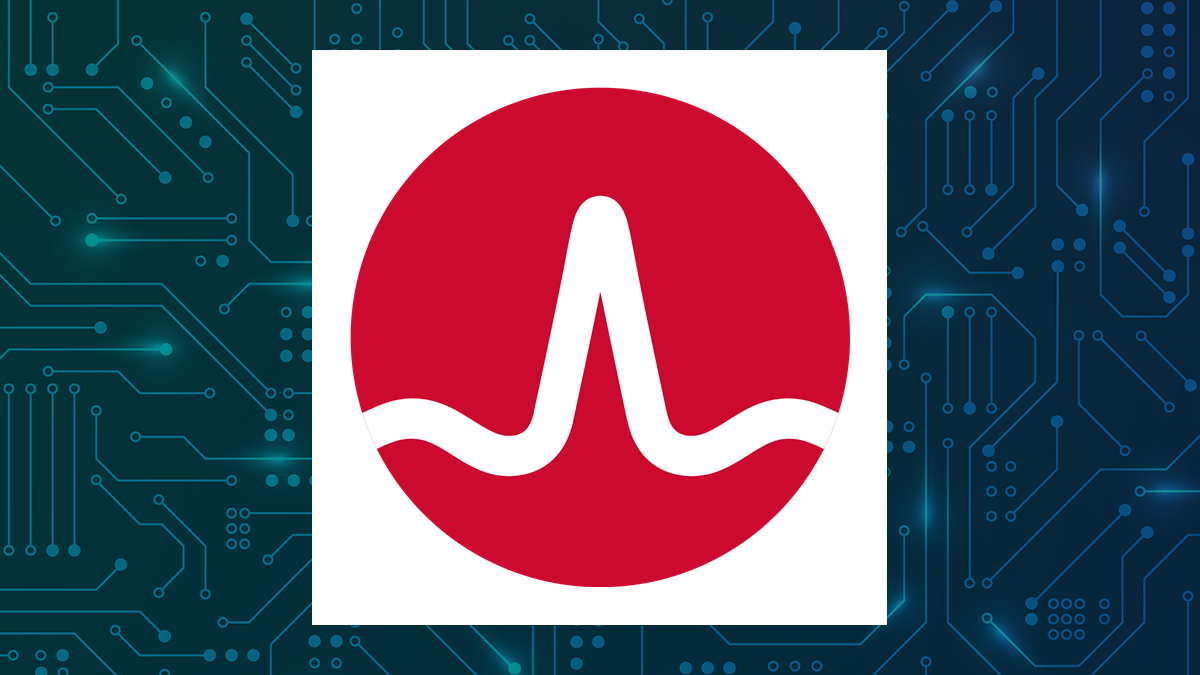
Broadcom, ServiceNow, AT&T, Apollo Global Management, Palo Alto Networks, Arista Networks, and Zscaler are the seven Telecom stocks to watch today, according to MarketBeat’s stock screener tool. Telecom stocks refer to shares of companies that provide telecommunications services such as voice, data, and internet connectivity. These companies often invest heavily in infrastructure and are known for producing stable cash flows, and the stocks are typically considered relatively defensive investments during economic downturns. These companies had the highest dollar trading volume of any Telecom stocks within the last several days.
Broadcom (AVGO)
Broadcom Inc. designs, develops, and supplies various semiconductor devices with a focus on complex digital and mixed signal complementary metal oxide semiconductor based devices and analog III-V based products worldwide. The company operates in two segments, Semiconductor Solutions and Infrastructure Software.
Shares of NASDAQ AVGO traded down $14.94 during trading on Thursday, reaching $157.15. 20,794,751 shares of the company traded hands, compared to its average volume of 30,350,268. The stock has a market cap of $738.91 billion, a P/E ratio of 128.18, a PEG ratio of 2.29 and a beta of 1.01. The firm’s fifty day simple moving average is $205.27 and its 200 day simple moving average is $196.37. The company has a current ratio of 1.17, a quick ratio of 1.07 and a debt-to-equity ratio of 0.98. Broadcom has a 12-month low of $119.76 and a 12-month high of $251.88.
Read Our Latest Research Report on AVGO
ServiceNow (NOW)
ServiceNow, Inc. provides end to-end intelligent workflow automation platform solutions for digital businesses in the North America, Europe, the Middle East and Africa, Asia Pacific, and internationally. The company operates the Now platform for end-to-end digital transformation, artificial intelligence, machine learning, robotic process automation, process mining, performance analytics, and collaboration and development tools.
ServiceNow stock traded down $42.73 during midday trading on Thursday, hitting $781.30. 1,244,106 shares of the company were exchanged, compared to its average volume of 1,420,746. ServiceNow has a fifty-two week low of $637.99 and a fifty-two week high of $1,198.09. The firm has a market capitalization of $160.95 billion, a PE ratio of 114.39, a price-to-earnings-growth ratio of 4.51 and a beta of 1.03. The business has a fifty day simple moving average of $933.06 and a two-hundred day simple moving average of $982.64. The company has a debt-to-equity ratio of 0.15, a quick ratio of 1.10 and a current ratio of 1.10.
Read Our Latest Research Report on NOW
AT&T (T)
AT&T, Inc. is a holding company, which engages in the provision of telecommunications and technology services. It operates through the Communications and Latin America segments. The Communications segment offers wireless, wireline telecom, and broadband services to businesses and consumers located in the US and businesses globally.
AT&T stock traded up $0.51 during mid-day trading on Thursday, hitting $28.65. The company had a trading volume of 31,693,882 shares, compared to its average volume of 36,283,924. The company has a current ratio of 0.66, a quick ratio of 0.62 and a debt-to-equity ratio of 1.00. The company has a market capitalization of $205.65 billion, a price-to-earnings ratio of 19.23, a P/E/G ratio of 3.00 and a beta of 0.56. The company’s fifty day moving average is $26.06 and its 200-day moving average is $23.67. AT&T has a 12-month low of $15.94 and a 12-month high of $29.01.
Read Our Latest Research Report on T
Apollo Global Management (APO)
Apollo Global Management, Inc. is a private equity firm specializing in investments in credit, private equity, infrastructure, secondaries and real estate markets. The firm prefers to invest in private and public markets. The firm’s private equity investments include traditional buyouts, recapitalization, distressed buyouts and debt investments in real estate, corporate partner buyouts, distressed asset, corporate carve-outs, middle market, growth, venture capital, turnaround, bridge, corporate restructuring, special situation, acquisition, and industry consolidation transactions.
NYSE APO traded down $15.49 during mid-day trading on Thursday, reaching $126.03. 6,741,403 shares of the stock were exchanged, compared to its average volume of 3,553,421. The company has a market capitalization of $71.90 billion, a P/E ratio of 17.24, a P/E/G ratio of 1.17 and a beta of 1.66. The company has a debt-to-equity ratio of 0.33, a quick ratio of 1.44 and a current ratio of 1.44. The business’s 50 day moving average is $150.71 and its 200-day moving average is $153.85. Apollo Global Management has a 1 year low of $95.11 and a 1 year high of $189.49.
Read Our Latest Research Report on APO
Palo Alto Networks (PANW)
Palo Alto Networks, Inc. provides cybersecurity solutions worldwide. The company offers firewall appliances and software; and Panorama, a security management solution for the global control of network security platform as a virtual or a physical appliance. It also provides subscription services covering the areas of threat prevention, malware and persistent threat, URL filtering, laptop and mobile device protection, DNS security, Internet of Things security, SaaS security API, and SaaS security inline, as well as threat intelligence, and data loss prevention.
Shares of Palo Alto Networks stock traded down $6.69 during trading hours on Thursday, reaching $166.49. The stock had a trading volume of 4,310,780 shares, compared to its average volume of 5,876,212. The stock’s 50 day moving average is $186.72 and its 200 day moving average is $185.38. Palo Alto Networks has a twelve month low of $132.50 and a twelve month high of $208.39. The firm has a market capitalization of $110.23 billion, a PE ratio of 93.80, a PEG ratio of 5.64 and a beta of 1.04.
Read Our Latest Research Report on PANW
Arista Networks (ANET)
Arista Networks, Inc. engages in the development, marketing, and sale of data-driven, client to cloud networking solutions for data center, campus, and routing environments in the Americas, Europe, the Middle East, Africa, and the Asia-Pacific. Its cloud networking solutions consist of Extensible Operating System (EOS), a publish-subscribe state-sharing networking operating system offered in combination with a set of network applications.
NYSE ANET traded down $7.07 during trading hours on Thursday, reaching $73.09. The company’s stock had a trading volume of 9,261,357 shares, compared to its average volume of 8,876,749. The firm has a market capitalization of $92.18 billion, a price-to-earnings ratio of 32.92, a P/E/G ratio of 3.10 and a beta of 1.30. The company’s 50-day moving average is $96.46 and its two-hundred day moving average is $101.60. Arista Networks has a 1-year low of $60.08 and a 1-year high of $133.58.
Read Our Latest Research Report on ANET
Zscaler (ZS)
Zscaler, Inc. operates as a cloud security company worldwide. The company offers Zscaler Internet Access solution that provides users, workloads, IoT, and OT devices secure access to externally managed applications, including software-as-a-service (SaaS) applications and internet destinations; and Zscaler Private Access solution, which is designed to provide access to managed applications hosted internally in data centers, and private or public clouds.
Shares of Zscaler stock traded down $11.83 on Thursday, reaching $195.21. The company’s stock had a trading volume of 2,527,516 shares, compared to its average volume of 1,908,955. The company has a market capitalization of $30.20 billion, a P/E ratio of -780.84 and a beta of 1.12. The stock has a 50-day moving average price of $202.77 and a 200-day moving average price of $194.42. Zscaler has a 52-week low of $153.45 and a 52-week high of $217.84.
Read Our Latest Research Report on ZS
See Also
- MarketBeat’s Top Five Stocks to Own in April 2025
- Tariffs, Spin-Out, and R2 Updates Are Positive Signs for Rivian
- Cathie Wood Loads Up on Baidu—Is It the Right Time to Buy?
- Big Buybacks: 3 Large Caps Exceed 5% Repurchase Power
- NVIDIA vs Qualcomm: Which Is the Better Buy for Q2?
- Broadcom’s VMware Strategy Could Fuel the Next AVGO Rally
